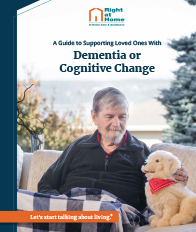When Your Loved One Has Problems Dressing
When Your Loved One Has Problems Dressing
When dementia progresses, your family member may develop difficulty in getting dressed. A person who has dementia may deal with it by sticking to a routine. It's because a routine feels safe and is comforting, and wearing the same clothes every day can be one of these routines.
Stages of Dementia When Dressing Problems Start
When your loved one is in the early stages of dementia or Alzheimer’s, you might notice some little behavior changes. Your family member may start to have difficulty zipping zippers, fastening buttons, or tying shoes.
If the difficulty isn’t from a medical reason, such as arthritis, your family member may have forgotten how. In this mild stage, you can buy clothing with closures that aren't complicated. It will give your family member the independence to still dress their selves.
Buying clothing with open side pants with adjustable fastenings on both sides is one option. It does away with buttons and zippers and lets your loved one take off and put on the pants easier. For shirts, magnetic buttons on the shirts will replace having to button small buttons. Another option is Velcro, which can be on pants, shirts, shoes, and slippers. Velcro on shoes has an adjustable strap, which allows the shoe to be opened wider for easier access.
In the middle stages or moderate stage of Alzheimer's, the loved one will need help the most. In Alzheimer's middle stage, it's the longest-lasting stage. It comes with impaired judgment, poor memory, and decision ability is affected. Your loved one might become irritable or frustrated when trying to do something as simple as getting dressed. They could even dress inappropriately for the weather.
Clothing designed for assisted dressing is a better choice for your loved one and for you. Tops that are open-back and wheelchair pants will make dressing your family member free from hassles. An open-backed top will let your loved one slip their arms through it, and you can fasten it. They won't have to put clothing over their head anymore. This is important because, at this stage of dementia, placing something over your loved one’s eyes or struggling with a neck hole can cause panic.
Pants that have an open back have the same benefits. Your loved one won’t have to stand to have pants put on. They can sit or lie down while the pants are pulled up over the legs and then wrapped around their waist. It's a simple and easy solution for a situation that can become complicated.
With late-stage Alzheimer's or dementia, your family member won't be responding to their surrounding environment or control their movements. They will need extensive assistance in everything your loved one does. Your family member will probably experience problems with disrobing and incontinence.
Using an anti-strip jumpsuit will eliminate the need for disrobing. These jumpsuits have a zipper in the back, so your family member can't disrobe without help. It will prevent your loved one from taking off clothes inadvertently.
Why the Correct Clothing is Important
When your family member starts to have issues with getting dressed, it can affect different areas. Some dementia patients will wear the same clothes every day. It can be covered with stains, and odor, match or clash, and even dress wrong for inappropriate weather.
Because it's a hassle for your family member to make a choice and then struggle to get dressed, they would rather just keep on what they are wearing. By having clothing that is easier for them to get in and out of, they may not resist a clothing change.
If you need caregiving assistance with your family member, call us at Right at Home today. We’re ready to give you and your loved one the care that is needed.

Dementia or Cognitive Change Guide
A free downloadable guide for those supporting loved ones with Dementia or Cognitive Change



